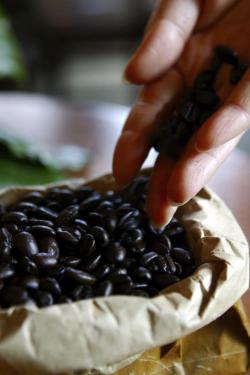Thai manufacturers are urging the government to scrap the tariff quota system for imported coffee beans.

Thai tariffs on coffee beans imported from Australia are scheduled to be removed on Jan 1, 2020. PATTARACHAI PREECHAPANICH
Thailand can only produce and supply 25,000-26,000 tonnes of coffee beans a year, mostly for domestic consumption, forcing the country to rely on imports of 50,000 -60,000 tonnes a year.
"The existing tariff quota system and the government condition that requires manufacturers to buy coffee beans from local farmers at guaranteed prices will definitely lead local coffee manufacturers to more hardship in the foreseeable future, as their production costs will exceed those for imported beans, particularly from Australia, which Thailand has a free-trade agreement with," said Varri Sodprasert, president of the Thai Coffee Association.
"Australia has come up with more advanced roasting technology and stronger brands," he said.
Thailand and Australia signed the Thailand-Australia Free Trade Agreement (Tafta) on July 5, 2004. The pact went into effect on Jan 1, 2005.
From 2005, Australia eliminated tariffs on more than 83% of all goods imported from Thailand, including fresh fruits and vegetables, canned pineapple and pineapple juice, processed foods, small passenger vehicles and pickup trucks, and gems and jewellery. Tariffs on the remaining 17% of imports, comprising plastic products, rubber and rubber products, and textiles and apparel, were eliminated during 2010-15.
Tafta called for Thailand to eliminate tariffs on nearly 50% of all goods imported from Australia as of Jan 1, 2005, most of which are raw materials such as mineral ore, fuel and chemicals, as well as raw and tanned hides. Tariffs on another 45% of Australian imports were dropped in 2010, with the remaining 5%, comprising dairy and meat products (beef, pork, milk and cheese), and tea and coffee, being gradually removed during 2020-25.
At the same time, Thailand removed tariff quotas under WTO obligations on 15 of 23 categories of agricultural goods. In addition, Thailand has also agreed to increase quotas each year by 5% to 10%.
Oramon Sapthaweetham, acting director-general of the Trade Negotiations Department, said Tafta stipulates that Thailand must scrap the tariff quota and waive the import tariffs on fresh coffee beans, roasted coffee beans and instant coffee on Jan 1, 2020.
Coffee beans are categorised as agricultural products subject to a quota system at 5.25 tonnes a year, carrying tariffs of 4%.
The government has set tariffs as high as 81% for imports outside of the quota.
The quota for instant coffee imports is set at 134 tonnes a year, with tariffs at 5.33%. Imports beyond that quota are subject to tariffs of 44.1%.
Ratree Menprasert, director of the Agricultural Economic Research Bureau in the Office of Agricultural Economics, said that over the last five years Thailand has averaged annual production of 26,000 tonnes of coffee beans, while demand has risen to 90,000 tonnes from 70,000 tonnes five years ago.
This year, she predicted demand would surge to nearly 100,000 tonnes, leading the country to import 58,000-60,000 tonnes.
"Over the last five years, Thailand's coffee plantations have continued to decline," Ms Ratree said. "Production is also inconsistent, as farmers, 70% of whom are in southern Thailand, have not chosen high-quality varieties and lack the plantation knowledge to improve the varieties' quality. Moreover, volatile weather also negatively affects the farmers' production."